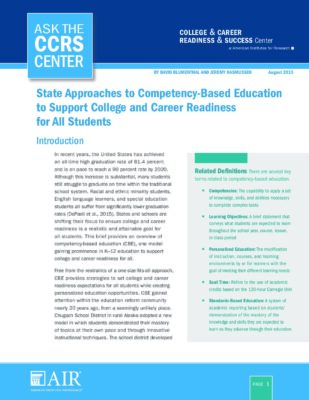Resource Hub
Explore guides, research papers, policy briefs, and tools to aid decisions on standards and assessments.
State Approaches to Competency-Based Education to Support College and Career Readiness for All Students
This brief provides an overview of competency-based education (CBE), a model that’s gaining prominence in K-12 education to support students’ college and career readiness. Although CBE currently does not have a universally accepted definition, a broadly accepted framework for CBE is “educational approaches that prioritize the mastery of learning objectives regardless of how long it takes” (p. 2). Three core elements of CBE include:
mastery (students demonstrate they met learning objectives that are measured in many different ways),
pacing (students advance at their own pace toward a learning objective), and
instruction (individualized learning).
While the current federal accountability system makes it difficult for states to fully adopt CBE, the brief provides examples of states adopting innovative approaches of using CBE elements to support students’ college and career readiness. Recommendations for how states can adopt CBE conclude this brief.


CBE can provide teachers, schools, and districts with personalized educational opportunities for students as a way for them to master college and career ready standards. This resource is intended to help state education agencies consider policy and programmatic approaches in supporting the adoption of CBE elements in their states. Although this resource is brief, it can be a helpful starting place for interested states.